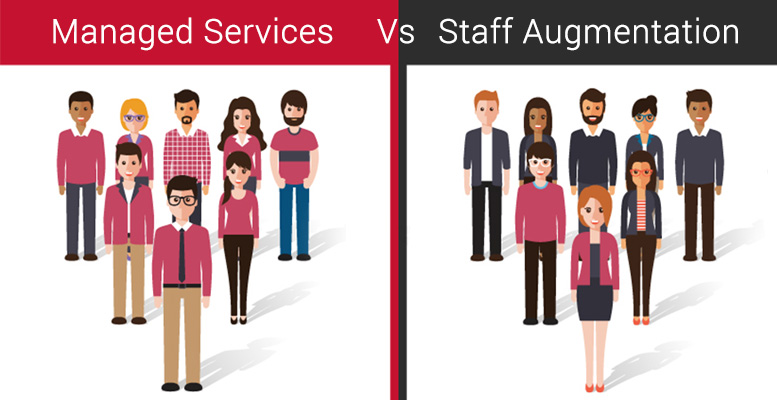
Managing IT projects in a fast-paced and agile environment is challenging. A major trouble faced by IT enterprises is ensuring enough technical staff to meet dynamic project demands and varying customer expectations. Hiring a permanent resource is not a viable option always. Some projects are time-based and could only last a few months.
In such situations, enterprises often seek third-party support to acquire the required technical competence. The two most popular approaches of filling this gap are IT staff augmentation and Managed Services model. While staff augmentation mainly refers to bringing in additional resources from outside, Managed Service model refers to outsourcing the technical requirements to an external IT services provider.
Both these approaches are defined by some specific features suitable for different projects. It is therefore essential to understand your business requirements well and make the right choice between the two. With this article, we try to help you make a well-informed decision while selecting a solution to fulfill the growing IT demands of your enterprise.
IT Staff Augmentation – What are the benefits?
Staff augmentation is a common strategy used by IT companies to bring temporary workforce to assist with certain operations or projects. This potentially has several benefits.
Cost-effective
Staff augmentation helps you cut company expenses in several areas. By bringing in resources to meet project specific demands, you can reduce recruitment expenses like employee benefits, taxes etc. Since these resources are usually hired based on their technical competence and know-how it also helps cut down technology and process training costs.
Fills special roles
Finding skilled and experienced IT resources for special roles is not easy. Staff Augmentation helps you fill special roles in IT projects like DevOps Engineers, Scrum Masters, Business Analysts etc. quicker and with less effort.
Gives you control on project
Augmented staff could work from your office or sometimes remotely. But they have their duties, roles and responsibilities well-defined just like your regular staff. It therefore ensures that you have complete control on your project so you can monitor and execute the project effectively.
Helps meeting strict deadlines
Staff augmentation is especially beneficial when you’re bound with time constraints and strict deadlines. In such crunch times, it is a good option to hire extra hands or temporary resources through staff augmentation. It helps you meet deadlines on time and implement the project smoothly.
Helps building a strong team
Software projects are dynamic in nature and customer expectations are always on the rise. You need skilled resources to carry out these IT projects. Staff augmentation helps you find and hire skilled technicians for a temporary basis. This allows you to evaluate their performance over time and retain good resources for future projects, building a strong team in the long-run.
Managed Services – Why outsource?
On the other hand, outsourcing IT services to third-party solution providers, aka Managed Service vendors also has its own benefits.
Convenient pricing models
Managed Service providers usually offer their services on a subscription model. Also, there are varied pricing models to suit your unique project requirements and you just have to pay for the services you utilize. Some popular managed service pricing models include tiered pricing, pay per device, pay per user, al a carte etc.
Expert services
One of the best advantages of outsourcing essential IT processes to a Managed Service provider is that activities are carried out by professionals who are trained and experienced experts in software delivery. You can stay assured that they will perform their tasks efficiently, leading to the success of your project.
No infrastructure and maintenance costs
Outsourcing IT processes releases you from the burdens of building an IT team, investing in IT infrastructure and maintaining it regularly. All you have to do is outsource it to a third party vendor and they will manage and maintain your processes remotely as well as upgrade you to newer technology as needed. You can trust these experts and entirely focus on your business goals.
Security and Compliance
The software industry is vulnerable to security attacks and you must adhere to the industry security and compliance standards to keep your information and business processes safe. Managed service vendors have the expertise to prevent and control such security threats and follow industry regulations and compliance procedures to keep your data, networks and systems secure reducing the risk of cyber-attacks at your enterprise.
Scalability
As your business grows and projects become more complicated, you need to scale your resources up and down as time demands. MSPs offer flexibility and extend support and to handle growth spurts or emerging IT problems. Additionally, you can increase your engagements with your managed service vendor when the demand for expert services rises.
Which is better for you?
It could be tricky to understand which solution suits you the best. Both Managed Services and Staff Augmentation have their own pros and cons, so it is important to make a wise decision. If you’re a small enterprise carrying out time-based IT projects where lesser number of skilled resources are required for a short duration, staff augmentation is the best option for you. You can hire resources on a temporary basis and even retain them in future if needed.
However, if you’re a growing business that needs skilled teams to work on a regular basis on multiple projects, it is best to hire a Managed Service provider and gain technical expertise from dedicated professionals without having to worry about building and maintaining your own teams.